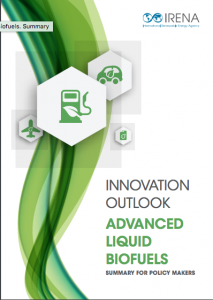IRENA has released the second report in it’s Innovation Outlook series called, “Innovation Outlook: Advanced Liquid Biofuels. The report looks at the global outlook future for liquid biofuel technology. According to IRENA, advanced biofuels can reduce greenhouse gas emissions by 60 to 95 percent as compared to fossil fuels. This, said the agency, puts biofuels in the position as the only alternative fuel to mitigate carbon emissions from the aviation sector that uses around 380 billion litres of jet fuel per year.
 While advanced biofuels are beginning to reach commercialization, IRENA says the pace of fuel development must accelerate and projects will need to be developed in a wider range of locations if advanced liquid biofuels are to realize their full practical and economic potential for displacing fossil fuels.
While advanced biofuels are beginning to reach commercialization, IRENA says the pace of fuel development must accelerate and projects will need to be developed in a wider range of locations if advanced liquid biofuels are to realize their full practical and economic potential for displacing fossil fuels.
“There is no way to meet our ambitious climate change targets without addressing transportation, and the fastest, most-cost effective route to low carbon transport is via advanced biofuels,” said Jim Lane, editor and publisher of Biofuels Digest, an external reviewer of the report. “An additional benefit of advanced biofuels is that they can be used in the same engines, fuel pumps and drive trains but produce profound reductions in carbon when compared to fossil gasoline and diesel.”
The report calls for decisive support from policy-makers to make advanced biofuels competitive. To ensure that advanced biofuel plants continue to be built and their costs continue to decline, policies and business models needs to advance alongside technological innovation.
According to the report, by 2045, advanced biofuels are likely to cost between USD 0.60 and USD 1.10 per litre to produce, meaning that with oil prices above USD 100 per barrel, most advanced biofuels should be able to compete effectively. But the report also predicts that if oil prices are below USD 80 per barrel, advanced biofuels production would have a difficult time competing with fossil based gasoline and diesel. Therefore, there is an urgent need for decisive policy actions that will unlock the potential for advanced liquid biofuels, and enable innovative business models to co-produce high value products along with biofuels.

